No CrossRef data available.
Article contents
Introduction
Published online by Cambridge University Press: 25 March 2011
Abstract

- Type
- Postwar Justice and the Responsibility to Rebuild
- Information
- Copyright
- Copyright © Carnegie Council for Ethics in International Affairs 2009
References
Notes
1 See, for instance, Clapham, Christopher, “The Perils of Peacemaking,” Journal of Peace Research 35, no. 2 (1998), pp. 193–210.CrossRefGoogle Scholar
2 For an exploration of the evolution of peacebuilding operations, seeParis, RolandandSisk, Timothy D., “Introduction: Understanding the Contradictions of Postwar Statebuilding,” inParis, Roland andSisk, Timothy D., eds., The Dilemmas of Statebuilding: Confronting the Contradictions of Postwar Peace Operations (New York: Routledge, 2008).Google Scholar
3 Weiss, Thomas, “The Sunset of Humanitarian Intervention? The Responsibility to Protect in a Unipolar Era,” Security Dialogue 35, no. 2 (2004), p. 138.CrossRefGoogle Scholar
4 On this, see in particularParis, andSisk, , Dilemmas of Statebuilding .Google Scholar
5 Ignatieff, Michael, Empire Lite: Nation-Building in Bosnia, Kosovo, and Afghanistan (London: Vintage, 2003), p. 80.For a far more critical account see, e.g., Chandler, David, Empire in Denial: The Politics of Statebuilding (London: Pluto Press, 2006).Google Scholar
6 Herbst, Jeffrey, “Let Them Fail: State Failure in Theory and Practice: Implications for Policy,” inRotberg, Robert, ed., When States Fail: Causes and Consequences (Princeton, N.J.: Princeton University Press, 2003).Google Scholar
7 SeeCaplan, Richard, International Governance of War-Torn Territories: Rule and Reconstruction (New York: Oxford University Press, 2006); and Paris, andSisk, , Dilemmas of Statebuilding .Google Scholar
8 Jackson, Robert, The Global Covenant: Human Conduct in a World of State (New York: Oxford University Press, 2000); and Bain, William, Between Anarchy and Society: Trusteeship and the Obligations of Power (New York: Oxford University Press, 2003).Google Scholar
9 Søbjerg, Lene Mosegaard, “Trusteeship and the Concept of Freedom,” Review of International Studies 33, no. 3 (2007), pp. 475–88.CrossRefGoogle Scholar
10 International Commission on Intervention and State Sovereignty, The Responsibility to Protect (Ottawa: International Development Research Centre, 2001).Google Scholar
11 Ibid., p. 45.Google Scholar
12 Walzer, Michael, Arguing about War (New Haven, Conn.: Yale University Press, 2004), p. 163.Google Scholar
13 Notable examples areOrend, Brian, “Justice after War,” Ethics & International Affairs 16, no. 1 (2002), pp. 43–56; and Bass, Gary J., “Jus Post Bellum,” Philosophy & Public Affairs 32, no. 4 (2004), pp. 384–412.CrossRefGoogle Scholar
14 This is the agenda ofBellamy, Alex J.in “The Responsibilities of Victory: Jus Post Bellum and the Just War,” Review of International Studies 34, no. 4 (2008), pp. 601–25.CrossRefGoogle Scholar
15 This is precisely the type of scenario that is discussed in this issue by Mark Evans.Google Scholar
16 Bellamy, , “Responsibilities of Victory,” p. 624.Google Scholar
17 Ibid., p. 622.Google Scholar


